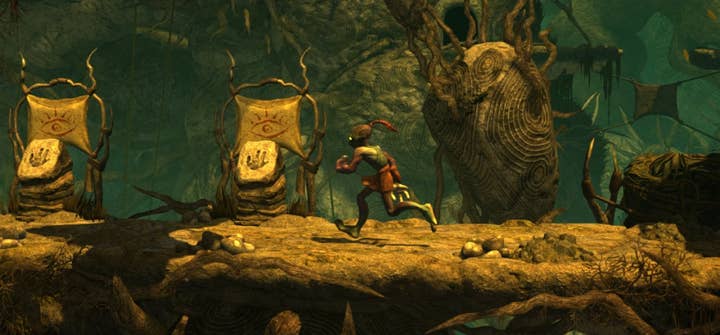Net neutrality the biggest issue facing games - Lanning
Oddworld creator worries gaming community won't shake political apathy until it hits their bottom line
Lorne Lanning pulled the plug on Oddworld Inhabitants' development activities in 2005 because he didn't like the trends he was seeing in the industry. Nearly a decade later, he sees a lot more to be positive about in the games industry.
Lanning is encouraged by the diversity of games being made, and the diversity of the people making them. He's been pleasantly surprised to see big console makers wooing indies and making it easier for small developers to not just exist but thrive. The same forces have also allowed Oddworld to make a comeback (with the help of developer Just Add Water), building its way up from digital re-releases of its catalog on new platforms to create the upcoming Oddworld: New 'n' Tasty, a multimillion-dollar remake of the original game in the series.
But speaking with GamesIndustry International at E3 earlier this month, Lanning said there's at least one big problem facing the industry that threatens to undo all that progress: Net neutrality.
"These are multinational, enormous corporations and if they get their way, they could stifle this indie community in the media."
"My biggest concern is what's happening in the White House with what's happening with the FCC and what's happening with the telecom companies trying to basically get more of all of our pie," Lanning said. "Like saying, 'Hey wait a minute, if you walk down our street we want a tollbooth on it. We want to toll the s*** out of you.'
"Now these people don't care about any of our profit, they care about their own. They care about their shareholders and they're goliaths. These are multinational, enormous corporations and if they get their way, they could stifle this indie community in the media. They could start really clamping the dial and taking away the revenue that we've finally been able to find that we can get, that allows us to keep going... Today on a $10 product, we get $7. Well what if $2 of that has to start going to AT&T or Comcast? That could very easily happen."
While American gamers haven't been feeling the pinch of various net neutrality rulings just yet, Lanning says the combination of greedy telecom companies and a government that is essentially subservient to their interests will likely lead to those parties lining their pockets at the expense of developers, and ultimately, consumers.
"That's my biggest concern, that they're going to squeeze that dial, live players are going to find themselves on a taxi meter, and that's why they should be voting and they should be supporting the Electronic Consumers Association and the lobby groups that have been trying to fight this stuff all along. All the gamers, it's going to come back on them if they don't stand up and show that we're going to vote you out of office if you pull this s***. That's not happening enough yet and I think the ECA is actually the one doing the most benefit to try and fight that."
"[S]adly I think that's how the general public tends to operate. When it hits their pocketbook, then they start diverting some energy to it, right?"
As for how the gaming public can be shaken from its collective political apathy, Lanning offers a grim solution.
"The easy way is they get hurt first," Lanning said. "That's not something I'm proposing but sadly I think that's how the general public tends to operate. When it hits their pocketbook, then they start diverting some energy to it, right? ...There are more people in this country that are struggling financially than probably in the history of the country, and as a result they're just not really paying attention to things that aren't affecting their bottom line, their purse. But if they start getting charged $10 a night for that overnight session that they like playing, I think they're going to vote."
Getting back to his reasons for stepping away from the industry in the first place, Lanning said the industry simply wasn't compatible with his creative ambition. Funding for the AAA scale products he wanted to make simply wasn't available unless he signed over the rights to the IP or gave a publisher the option of ultimately acquiring his company. Neither of those fit with the reasons Lanning had for starting Oddworld in the first place.
"What I was always inspired by, what made me want to start a games company, was that I always loved [Jim] Henson. I always loved Dr. Seuss. I loved Walt Disney, what they were doing...They created things that they lived with for the rest of their life. They nurtured their characters for the rest of their life."

Lanning wanted to do the same with Oddworld, nurturing the world and the characters through project after project over the course of his career.
"The plan was build great content that people love, build the universe and keep building it. That became increasingly difficult as budgets rose, as the industry changed, and so we made the decision to basically take a big gamble and because we did own our intellectual property, we owned all the games, we waited for digital distribution to start coming up."
"I want to return to building really AAA content but ideally, fingers crossed and hoping the audience likes what we do, that we'll be able to self-fund it."
When Oddworld re-emerged, it did so first by getting its earliest games released more-or less untouched on Steam and PlayStation Network. At the time the investment in doing so was tens of thousands. But they did well enough to put some money in the bank and fund larger projects, like the HD release of the final game from Oddworld's original run, Stranger's Wrath. Lanning said that project was a couple hundred thousand dollars to produce, but its success helped fund New 'n' Tasty, which the company has put "a couple of million" into so far.
And at that time we just started investing what we could so in the beginning tens of thousands of dollars, and can we just get it up on Steam and can we get our Xbox games over to PS3, to PC? And those became hundreds of thousands of dollar bets because really we didn't have the money to fund new content. Lanning admits that it's still not enough money to make the new AAA IP with original characters, innovations, and mechanics, but that's a realm he'll return to only if the conditions are right.
"I want to return to building really AAA content but ideally, fingers crossed and hoping the audience likes what we do, that we'll be able to self-fund it," Lanning said. "And that's why Bungie is in the spot that they are now. That's why Insomniac's in the spot that they are, because they're self-funding really high-end AAA content. Because of that, it puts them in a different league."
Lanning said he'd ideally like to get Oddworld into that league, where the studio self-funds development enough to get a distribution deal instead of a traditional publishing arrangement.
"That's a big difference," Lanning said. "A publishing deal has lots of hooks in it, lots of little trap doors as well. But a distribution deal can be that they're just distributing your product. It's a different ratio. More money comes back to the company, there's more money to be made on digital distribution for those outlets, for those developers, that they don't need to share with any publisher if they're self-funded... For Oddworld it can't be that old type of deal. We've been there, we know how it works, we're not interested. But with success hopefully we can get there on our own. "

